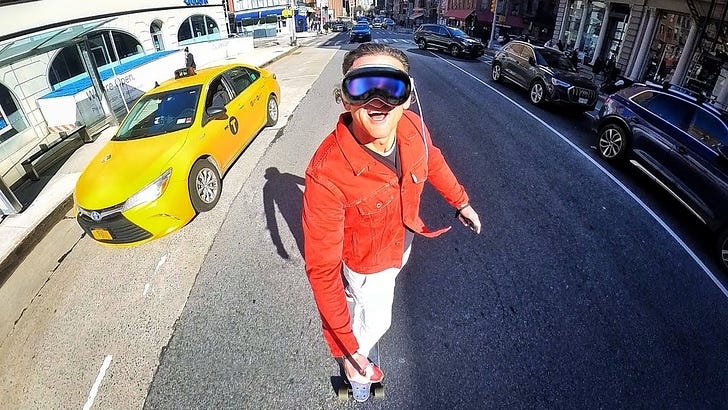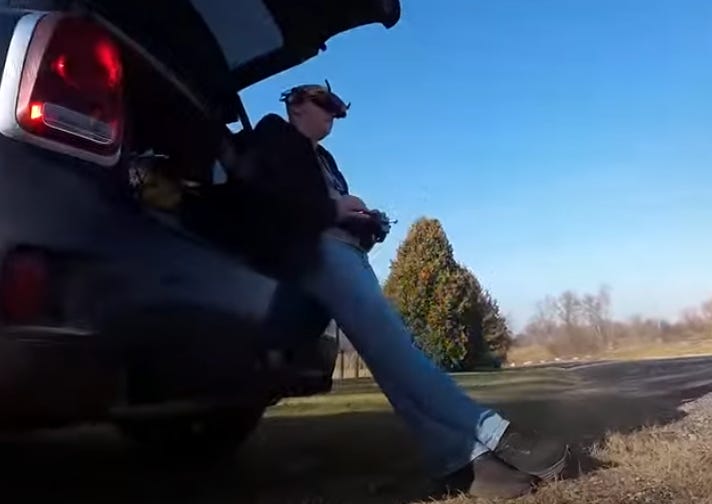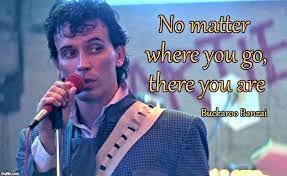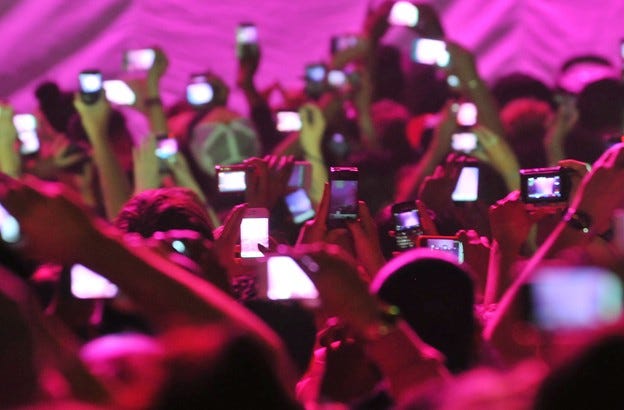It’s nearly certain I will own an Apple Vision Pro, the current version of the magic portal into the future we get every few years. I had a dev-kit Google Glass and was a day-1 Newton buyer. I love seeing the future unfold, and I’m genuinely looking forward to the moment.
Which is why I wanted to write about it before I have one in my hands, because I’ve been thinking about this a lot, and I’ll be all Fanboi Squee later.
Since my very first experiences with computers in the ‘80s, I knew that my own neuro-salad issues with sensory processing and complex environments were wonderfully aided by technology that limited and re-presented reality. The long, predictable path from Mondo 2000-era Jared Lanier and Apple’s new 600 gram facebrick is well trod for many of us existentially-optimistic curious psychonauts. I barely believe the “real” world exists, in any provable way. The movie “Free Guy” or the books of Jed McKenna encapsulate my sense of things pretty well.
I am the target market, I assume I will have my doors blown off, at least that’s what Casey Neistat convinced me:
And I love strapping screens to my face if that’s what immersion requires. I really do! I’ve been chasing the thrill of flight since I was a boy, and I spend TOO MUCH TIME doing this now. I’m foundationally all in:
But note that at the end of this video, there’s me, standing in a parking lot with my dork-helmet on, checked out of the “real” world around me while I’m flying 50mph through the trees, virtually.
Utterly disconnected.
Why It’s Already Great
I spent the better part of a year using a Valve Index for work a few hours a week, and it was great: infinite bloomberg screens, giant persistent workspaces, distraction removal. I played all the tentpole games, tried all the cool experiences and explorations.
But that’s using VR/AR as a tool, not a way of being. What is both intriguing and disturbing about the Apple Vision (and the videos like Casey’s above) is the idea of bringing this virtual world with you everywhere. Obviously the tech isn’t completely there — the dork factor is infinite — but it’s also really obvious where it’s going. Cell phone in the pocket, glasses on the face, and your chosen set of AR supports is always at hand, from directions to distractions.
This doesn’t seem far fetched at all. It wasn’t very long ago I left the house without my cell phone regularly, but wouldn’t think of going for a hike without a paper map. These days it’s the opposite. I’ve made my own choices about not relying on tech when im out in the woods (I don’t even wear headphones), but I’m not going to diss folks who want to use AI-enabled smart-binoculors to learn their birds (yes, they exist).
Even tech as simplistic as the Meta Quest - literally 10% the cost of the AVP - has phenomenal, positive use cases. I’ve turned a bunch of folks onto meditation using TRIPP on the Quest, for instance, and virtual tourism is pretty great.
So I’m all in on VR. But…
The Meaning Crisis & Problem of Abstraction
What happens to us, as people, when we live more and more abstracted lives? Technological progress has largely been about creating higher and higher levels of abstraction after all: spoken words are abstractions for thoughts, written words abstract spoken words. A phone call is an intermediated abstraction of a face-to-face conversation, and so on. Without even thinking about it, the majority of my time is actually spent in some level of abstraction from pure sensate experience.
When I play a good VR game — like Half Life Alyx — the most interesting part is when I power off the headset and come “back” to reality. I leave a world of incredibly bright colors and high contrast (and radically reduced information density), and I return to the real world — messy, low contrast, cluttered, too busy, and yet somehow still dull. What was a breath-taking cityscape in which I was a bad-ass solving problems and exploring a weird world is just my living room.
No matter where you go, there you are.
I spend a lot of time thinking about “the PolyCrisis” — and one of the “mono” items in the “poly” is the Meaning Crisis. Cognitive Scientist John Vervaeke has spent much of the last 5 years talking and teaching about it, and I highly recommend his 12 part series on the topic, but fundamentally: we’re drowning in fakeness and layers of abstraction that don’t make sense. In short, bullshit. From his series:
“Bullshit is on the increase. It's more and more pervasive throughout our lives and there's this sense of drowning in this whole ocean of bullshit. And we have to understand why is this the case and what can we do about it? So today there is an increase of people feeling very disconnected from themselves, from each other, from the world, from a viable and foreseeable future.”
Everyone nods when you mention this: from the media we consume to the political candidates we are presented with to the narrative shenanigans weekly documented by Epsilon Theory, to the language parsing of economic reports. It all increasingly seems fake.
One of Vervaeke’s regular co-panelists is hemispherism-guru Iain McGilchrist (his The Matter with Things is my book of the decade so far), and one of McGs key observations is that modern western society, has become massively left-brain dominant. One of the key characteristics of the left brain is it’s propensity to create the virtual world-model we think of as “reality” projected in our own consciousness. From TMWT on the left hemisphere:
"[The left] will be focussed not so much on the past as on the future. In order to do this it needs to go 'offline', if you like, from the real world, and be able to consider various possible courses of action in a virtual fashion. For this, reality needs to be drastically simplified, 're-presented', rather than actually present (with all the obfuscating complexity that would bring with it): it needs to be mapped.”
This remapping of reality — far too complex for our squishy eyes to really perceive — is ultimately what we all convince ourselves is “real.” It’s just a model of the environment, flawed, broken and influenced by mind-state. “Reality” is already an abstraction.
Vervaeke and McGilchrist and others have been arguing for years that the increased levels of abstraction required by modern life create even more reliance on the left brain, and thus even more layers of abstraction, essentially trapping ourselves in a bullshit-loop of our own making. Consider that for every scene like this:
There’s the day to day reality of this:
Yes, we’re all heads down our own abstracted virtual world already — but we’re also hungry for the real world experiences — even if only to document them out of some egoic need to say “I exist! I participated in reality! I was there! I have evidence!”
So what happens when the vibrant, luminous world around us — even in the boring living room — is even further abstracted through the pass-through cameras of a virtual reality rig? When we aren’t just “missing the concert” because we’re staring at our recording cell phone, we’re “missing the concert” literally, because we see it live on screen from our $2,000 Taylor Swift concert seat? After all, I’m sure the real-time concert integration at the Sphere is gonna be lit.
Do we need a heads-up display for awareness itself? Or is this just one more layer of “bullshit” — another way for our Left Hemisphere to “go offline” from reality at a higher level of abstraction?
Cutting Through
The “fix” for the meaning crisis presented by Vervaeke (and most others) is surprisingly personal: an “ecology of practices.” That’s a fancy way of saying “things you personally do in your free time to make your life better.”
Everyone has some practice related to counteracting the impacts of their 9-5, day-to-day interaction with the modern world. When you get up from your desk, I’m sure you at least stretch, or yawn, or “get some fresh air.” You physically re-limber and re-orient your body in space when freed from the computer. But how much mental-stretching do you do?
For those of us lucky enough to live in nature, #GetOutside covers a lot of ground, and the more time I spend on screens — especially the kind strapped to my head — the more time I try to make sure I’m out in the snow and the sun. Touching grass. Forest bathing. Of course all that’s part of my playbook for right-brain re-engagement.
But the big shift happened for me when I started really exploring reality quietly in meditation. Specifically, my meditation practice (mostly influenced by Zennies and Daniel Ingram) is largely about seeing through the abstractions always present in the 5 senses and in thoughts. Having spent an hour staring at a wall every day for a few years, I can tell you is it’s *shocking* how wrong my brain is about almost everything I perceive, how quickly ego and internal dialog can hijack anything, but also how possible it is to simply turn it all off with the simple application of time and attention.
There’s no magic here. There’s really not even any Woo. We practice all sorts of things to get better at them. All sitting on the cushion is to me is practicing noticing reality. It turns out, you get a lot better at it, just like you get stronger if you lift heavy objects every day. And over time, I think these kinds of practices do bring us closer to some preindustrial understanding of what it means to be. Call it awareness of the Tao, or “Mettis,” or tracking, or God or the Akashic field or the innate tugging of nuclear binding energy on the Higgs Field or Quantum Monism, or as Tom Morgan prefers — “the anomoly.”
I’m also pretty sure whatever “it” is doesn’t survive the recording and reproduction process of VR, anymore than the sense of wonder and connectedness from a morning walk in the woods survives copping down the trees to make lumber. I suppose in some small way “the spirit of the woods” lives in the 2x4s, but I’ve had few transformative experiences at Home Depot. There is always — always — something lost in translation. And the truly spontaneous insights that come from randomness - loss of ego, groking impermanence, the experience of unity - to date I have yet to encounter these anywhere but in the natural world or on the cushion or with other humans, face to face.
I don’t think that tech is every really inherently good or bad — it’s almost always people that mess things up. But I’m increasingly attentive to the parts of our world which mess with levels of abstraction. Maybe in 10 years, when the AR tech is fully baked and as ubiquitous as cell phones, we will have learned how to use this tech not to create more layers between the real world and ourselves, but to explore internally as well. I know the folks at TRIPP are trying. I hope they succeed.








Love this. Have you tried a variety of meditation methods and found 'yours' or did the first one stick? Would love a deep dive on that and specifics of what you do / how the experience changes over time (if it ever interests you to write about)
“I’ve turned a bunch of folks onto meditation using TRIPP on the Quest”
I don’t know man, to me, tech is the opposite of meditation… but I’m open to changing my mind. Next time I see you bring a Quest, I’d love to see how it goes.